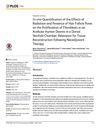 1 citations,
October 1990 in “The Lancet”
1 citations,
October 1990 in “The Lancet” Using minoxidil for hair growth may cause skin lesions in some people, and taking breaks from nitrate patches for angina might worsen symptoms.
 February 2024 in “Skin health and disease”
February 2024 in “Skin health and disease” Exosomes could improve skin and hair treatments but are limited by cost, production difficulty, and need for more research.
[object Object]  September 2013 in “Experimental Dermatology”
September 2013 in “Experimental Dermatology” The document concluded that stem cells are crucial for skin repair, regeneration, and may help in developing advanced skin substitutes.
 70 citations,
February 2017 in “Dermatologic Surgery”
70 citations,
February 2017 in “Dermatologic Surgery” Treatment with plasma rich in growth factors improved hair density and thickness for hair loss patients.
 2 citations,
May 2015 in “PloS one”
2 citations,
May 2015 in “PloS one” Hair follicle pores help cell survival and growth, even after radiation.
 26 citations,
October 2018 in “Clinical & Translational Oncology”
26 citations,
October 2018 in “Clinical & Translational Oncology” Spanish experts provided guidelines for treating skin side effects in cancer patients on new therapies, stressing early action and teamwork.
 11 citations,
January 2019 in “Dermatologic Therapy”
11 citations,
January 2019 in “Dermatologic Therapy” Not enough evidence to support using platelet rich plasma for hair loss treatment.
 343 citations,
December 2008 in “Endocrine Reviews”
343 citations,
December 2008 in “Endocrine Reviews” Metformin helps with menstrual cycles and insulin levels in PCOS but is less effective for hair growth, diabetes prevention, and weight loss, and may improve fertility and reduce diabetes risk.
 245 citations,
January 2018 in “Bone Research”
245 citations,
January 2018 in “Bone Research” TGF-β is crucial for tissue repair and can cause diseases if not properly regulated.
 184 citations,
October 2007 in “Proceedings of the National Academy of Sciences of the United States of America”
184 citations,
October 2007 in “Proceedings of the National Academy of Sciences of the United States of America” Sulforaphane from broccoli can help protect skin from sun damage.
 114 citations,
February 2012 in “International Journal of Dermatology”
114 citations,
February 2012 in “International Journal of Dermatology” Smoking harms the skin, causing early aging and increasing cancer risk, but stopping smoking can improve skin health.
 92 citations,
June 2017 in “Journal of Plastic Reconstructive and Aesthetic Surgery”
92 citations,
June 2017 in “Journal of Plastic Reconstructive and Aesthetic Surgery” Microneedling is a safe and effective treatment for various skin conditions, often preferred for its fewer side effects and shorter recovery time.
 88 citations,
May 2005 in “Journal of Dermatological Science”
88 citations,
May 2005 in “Journal of Dermatological Science” Versican, a protein, is less present in thinning hair follicles and this decrease might contribute to common hair loss in men.
 85 citations,
October 2012 in “Dermatologic Clinics”
85 citations,
October 2012 in “Dermatologic Clinics” Alopecia Areata is an autoimmune condition often starting before age 20, with varied treatment success and a need for personalized treatment plans.
 47 citations,
February 2021 in “Pharmacological research”
47 citations,
February 2021 in “Pharmacological research” Exosomes can improve skin health and offer new treatments for skin repair and rejuvenation.
 46 citations,
May 2018 in “Dermatologic Surgery”
46 citations,
May 2018 in “Dermatologic Surgery” PRP injections effectively treat hair loss, with positive results in both monthly and every three months treatments.
 31 citations,
February 2014 in “Journal of dermatological science”
31 citations,
February 2014 in “Journal of dermatological science” Placental growth factor may help treat hair loss.
 24 citations,
October 2017 in “Biomolecules”
24 citations,
October 2017 in “Biomolecules” Some growth factors, while important for normal body functions, can cause diseases when not regulated properly.
 23 citations,
October 2018 in “Expert Opinion on Drug Safety”
23 citations,
October 2018 in “Expert Opinion on Drug Safety” Consider benefits and risks of new alopecia treatments for safety.
 23 citations,
July 1996 in “Archives of Dermatological Research”
23 citations,
July 1996 in “Archives of Dermatological Research” bFGF, VEGF, and minoxidil decrease collagen production in hair cells, possibly affecting hair growth.
 22 citations,
June 2007 in “Radiologia Medica”
22 citations,
June 2007 in “Radiologia Medica” Testicular microlithiasis may increase the risk of testicular cancer and patients with it should be closely monitored.
 22 citations,
April 2006 in “Journal of Dermatological Science”
22 citations,
April 2006 in “Journal of Dermatological Science” Vitamin C derivative increases versican in cells, potentially aiding hair growth.
[object Object]  18 citations,
April 2022 in “Frontiers in bioengineering and biotechnology”
18 citations,
April 2022 in “Frontiers in bioengineering and biotechnology” Gelatin microspheres with stem cells speed up healing in diabetic wounds.
 18 citations,
May 2018 in “International Journal of Molecular Sciences”
18 citations,
May 2018 in “International Journal of Molecular Sciences” Human body's immune cells are more common in the layer of fat just beneath the skin than in deeper fat layers.
 16 citations,
February 2018 in “Journal of Cosmetic Dermatology”
16 citations,
February 2018 in “Journal of Cosmetic Dermatology” Carboxytherapy may help increase hair growth in alopecia patients but requires ongoing treatment.
 16 citations,
November 2016 in “Journal of Cosmetic and Laser Therapy”
16 citations,
November 2016 in “Journal of Cosmetic and Laser Therapy” Laser and light therapies, especially the 308 nm excimer laser, are effective and safe for treating alopecia areata, but more research is needed.
 15 citations,
May 2015 in “Photomedicine and Laser Surgery”
15 citations,
May 2015 in “Photomedicine and Laser Surgery” Low-Level Laser Therapy may help with flap survival and burn scar healing, but not with venous ulcers or hair loss, and more research is needed.
 15 citations,
March 2012 in “International journal of nanomedicine”
15 citations,
March 2012 in “International journal of nanomedicine” Local injections of nanosized rhEPO can speed up skin healing and improve quality after deep second-degree burns.
 12 citations,
May 2019 in “Aesthetic Surgery Journal”
12 citations,
May 2019 in “Aesthetic Surgery Journal” Platelet-Rich Plasma and stem cell therapy can increase hair count and density, but the best method for preparation and treatment still needs to be determined.
 11 citations,
June 2020 in “Dermatologic Therapy”
11 citations,
June 2020 in “Dermatologic Therapy” PRP treatment improves hair density and diameter in women with androgenetic alopecia.






























